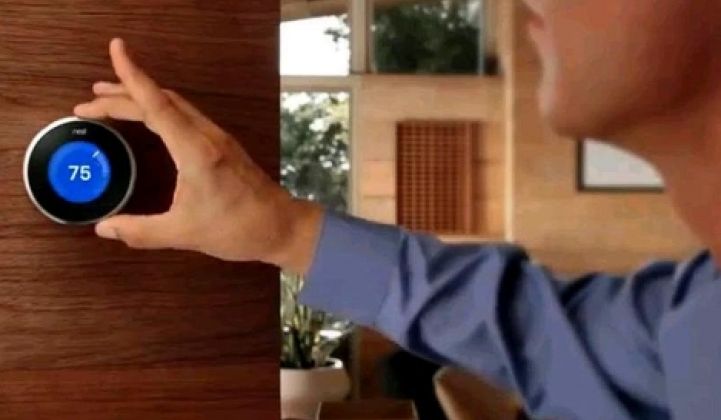Starting today, select Airbnb hosts will be given free Nest thermostats to install in their apartments and homes.
The partnership is being billed as a way to make the rental service more environmentally friendly. It's also a shrewd business move for Nest.
In July, Airbnb released its own self-commissioned study, conducted by the Cleantech Group, that concluded its North American users consume 63 percent less energy than guests who use standard hotels. The study was based on survey results from 8,000 hosts and guests about appliance use and transportation habits, which were then compared to the top-performing hotels that have implemented energy savings measures.
Pitting the results of a user survey against well-cataloged energy performance metrics from hotels is not exactly an apples-to-apples comparison. But Airbnb has been using the results to push the message that its services are energy-efficient, both in a bid to win more environmentally aware consumers and to influence the ongoing public debate around regulations designed to stymie the service.
From Airbnb's perspective, giving away free Nest thermostats is a good way to frame the company's new eco-friendly branding.
“Airbnb wants to help hosts on their quest to be green. We want to enrich the lives of our hosts, their properties, and the communities they live in. This partnership with Nest gives our hosts access to state-of-the-art technology that is both beautiful in design and at the same time is good for the planet," said Airbnb's head of business development Lex Bayer in a statement.
Nest is also messaging the alliance in feel-good green packaging. But for the Google-owned company, it's also a way to build its reach and sell more services to the roughly half-million people that list their properties on Airbnb.
Airbnb users have already been talking about Nest thermostats as an important feature -- and not just because of energy savings.
Last October, Jon Wheatley, an Airbnb host who made $13,608 in yearly profit, wrote a piece on the website NeedWant explaining why the device can be helpful to those renting out their apartments or homes to strangers.
"Nest has a great 'auto away' feature that activates when nobody walks past it in a predetermined amount of time. This turns off all heating and cooling when nobody is in the unit and you and your guests don’t need to think or worry about it. The cost of a Nest probably pays for itself in a couple of months with this feature alone. This also lets you login to your Nest account and see if a guest has arrived safely or not without having to bother them," he wrote.
Others have piled on, calling the Nest a "must-have" for people listing their dwellings.
"A quick search of the site shows many Airbnb listings with Nests. As homes evolve to be aware of and responsive to us, they know we’re there. And anyone with access to their data streams knows we’re there too," wrote Forbes' Kashmir Hill, describing the allure of the device beyond energy.
Presumably Nest, sensitive to the speculation about privacy and its relationship with Google, is not going to pitch its devices as a way to monitor a home. But it's a nice perk for hosts.
In July, Nest bought the home video monitoring company Dropcam for $555 million. One could imagine Airbnb hosts using the cameras in select outside locations (doing so inside would be illegal without notification, not to mention creepy) to see when guests arrive and leave. It's important to note that Nest is not talking about Dropcam in this context, but it's possible to see how other products could fit into the picture.
Nest is also providing the Airbnb hosts with free access to MyEnergy, the energy monitoring service it acquired in May of last year to get deeper into home performance. Bringing thousands more customers onto the platform is a great way for Nest to gather more information on how people are using the devices and saving energy, while potentially pitching more services like residential demand response as the company expands utility partnerships.
Finally, Airbnb has clocked more than 10 million guests since it was founded. If Nest can get its sleek product in thousands of rental units where tens of thousands more people are likely to see it, that's an invaluable branding opportunity.
The alliance between Airbnb and Nest is certainly about making the "sharing economy" more efficient. But Nest has landed a very important deal that has much more value than helping people save a bit of money on their energy bills.



